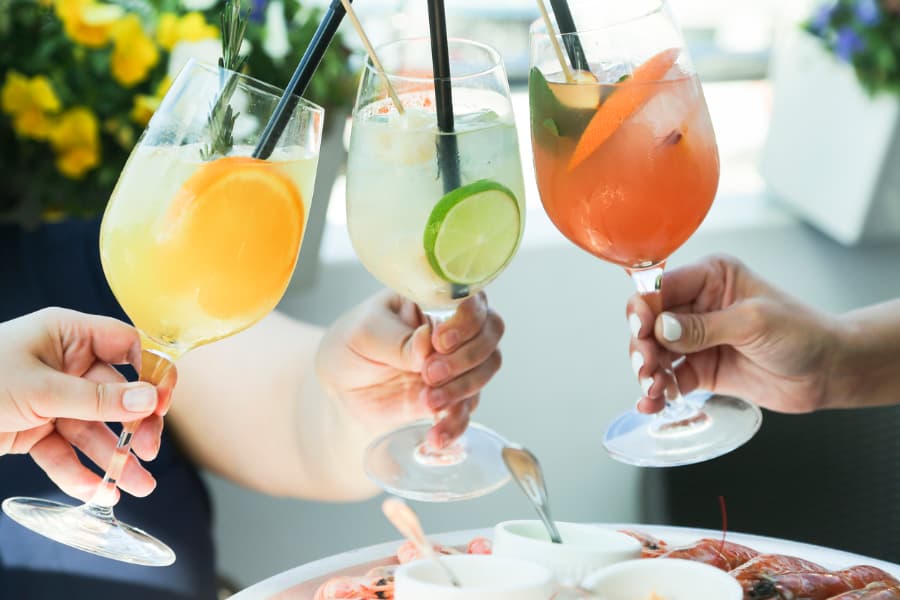
Citrus Garnish and Splash
A lot of drinks call for citrus as a cocktail garnish on the rim of a glass. A Gin and Tonic, for example, is served with a lime slice. Some like to add a squeeze or splash of that lime slice into their drink for flavor. Sometimes a lemon slice is added to an Old-Fashioned or Martini. In addition, a slice of lemon often accompanies non-alcoholic beverages like iced tea, sparkling water, and sometimes a soda.
The Use of Zest or Citrus Coins
Zest is the outer part of the peel, removed with a channel knife or zester, and can be used to add subtle flavor to a drink. You can also use a citrus coin, a round-shaped piece of peel made with a paring knife from an orange, lemon, lime, or sometimes even grapefruit. Most commonly, zest is used to dress a beverage with a few drops of their aromatic oil for scent and taste, and then the peel is hung on the inside or dropped into the glass. This is an age-old practice in mixology that remains an important part of bartending today.
Zest is also used in the development of citrus powders and infusions. It can also be frozen in a freezer-safe container or bag until you are ready to use it. But if left out it will dry out, so it must be used quickly.
If you plan to use a citrus garnish, do not add a coin or zest. That combination would result in too high a level of citrus flavor for your drink. Use one, or the other.
Citrus Pulp
If you juice fruit with an electric juicer, you get pulp as a byproduct. You do not have to throw it away. It can be used to create cordials or citrus salt. There are about as many different recipes as there are bartenders. Well, maybe not quite that many. Some add citrus peel in with the pulp to increase the flavor.
For citrus salt, simply put the pulp and peels in the blender with sugar. Lay the mixture out and dehydrate. The result makes a smooth bittersweet rim garnish and can be used in place of salt for Margaritas.
Of the many different cordial recipes, some are made as a non-alcohol drink in and of themselves. As for a citrus cocktail, cordials are used in such drinks as a Daiquiri or Gimlet.
Using Citrus Husks for Citrus Stock
If you juice fruit with the peeling on, then you have remaining citrus husks. Do not throw them out! Some inventive bartenders, such as Iain Griffiths and Kelsey Ramage of Trash Tiki fame, use them to create a citrus stock.
To make it, cover the husks with water on the stove and boil for roughly five minutes. Remove the husks. Return the flavored water and boil until only about 50 percent of the fluid remains. Mix in 1/3 cup sugar to about 3 cups of the fluid and stir. Add in a very small percentage of citric acid and malic acid and stir. Just how much of each acid depends upon the type of citrus fruit you are using and your personal taste. Griffiths and Ramage call this citrus stock, and it can be used as a cordial for mixed drink cocktails.
Why Use the Entire Citrus Fruit?
Today, even bartending is about sustainability and creating less waste. By using the entire lime, lemon, or orange, you are doing both. Citrus is commonly used in a wide variety of cocktails. You may be tempted to simply use the juice. It does offer a fresh flavor along with acidity to many cocktail beverages. But consider taking advantage of what the rest of the fruit has to offer.
No matter what parts you want to use, be mindful of the fruit’s longevity. Once peeled or sliced, the quality can deteriorate fast. Its juices oxidize quickly and should be used within three to eight hours, although some of the more neutral juices such as orange, grapefruit, and pineapple can last up to 24 hours. When stored in the refrigerator, juice can last for three to five days, but you should check it carefully before using it to ensure it has not lost its flavor or spoiled.
Learn More About Citrus-Blended Cocktails From Columbia Distributing
Across Oregon and Washington, you can count on Columbia Distributing for the alcohol and non-alcohol brands you and your customers want. From our hubs in Portland and Kent, we will get you the supplies you need quickly and efficiently. To learn more contact us.